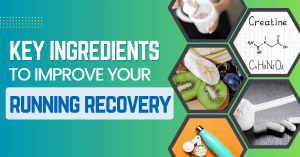I often get asked about what supplements are best for runners. I am not surprised, since many magazines, in order to keep getting clicks, seem to produce a headline at least once per month touting the amazing benefits of x supplement or nutrient.
But, do supplements really make that much of a difference? If so, which ones have the most impact?
In this article I’ll give you the science behind exactly what supplements are worth taking (and why) and at the end how to best and most easily include them all in your daily plan.
Do Runners Even Need Supplements?
So, the first question we need to answer is – do you need supplements to be the best runner you can be?
No.
That’s right, in an article about what supplements runners should be taking I’m telling you that they aren’t 100% necessary.
That’s because supplements are designed to be just what their name implies – a supplementation to your daily intake if you’re not getting enough through your diet.
It’s perfectly possible to get the required daily intake of any supplement through diet alone.
That said, most runners don’t eat the perfect diet all the time. Work, family, stress and a bunch of other factors lead to us to often being low in critical vitamins, minerals and micronutrients that can improve our health performance.
Therefore, the below list of recommended supplements for runners includes those that (1) have been shown by actual science to be a benefit to endurance athletes; and (2) those that runners often find difficult to fit into their diets consistently.
Supplements I recommend
I have listed a few of the supplements below in order of importance and/or the issues most runners struggle with and that I recommend.
This is by no means an exhaustive list, but includes the supplements that (1) have the most scientific research supporting their efficacy and (2) that I have found most runners are lacking. As an example, B-Vitamins have been shown to improve performance, but they are very easy to get in your diet and very few runners would benefit from supplementation.
With that said, here are my recommendations:
Iron
Low iron levels in runners is one of the most common reasons for poor results during workouts and races.
Recent research indicates that almost 56% percent of joggers and competitive runners suffer from an iron deficiency that severely hampers performance. That’s because runners lose more iron than most athletes due to a number of factors, such as losing iron through a process called foot strike hemolysis as well as through sweat and the GI tract.
In terms of impact on performance, a 2011 study showed that runners with low iron were 21 seconds slower over a 2km time trial than those with proper iron levels.
Now, as for supplementation, I first recommend you get a blood test to determine your actual iron levels. Not only is this important to determine if you are low or not, but it gives you a baseline for what your iron levels are and how much supplementation is improving them.
I recommend you read this very in-depth guide on iron deficiency which goes over how to get tested and how to supplement if you find your iron levels are low.
Vitamin D
Vitamin D is an important component of a runner’s diet and recent research on the vitamin has concluded that it may be more significant for overall health than initially realized.
According to a March 2009 study in the Archives of Internal Medicine, more than three-quarters of adults are Vitamin D deficient.
Furthermore, a 2008 study at the Cooper Clinic in Dallas found that 75 percent of runners averaging 20 miles a week have low vitamin D levels.
As a result, the recommended daily intake for vitamin D has increased in recent years, particularly for runners. Athletes should pay special attention to meeting these new requirements for vitamin D.
We’ve written another in-depth guide on some of the performance and health impacts of low Vitamin D levels, which you can read here.
If you are afraid you are low in vitamin D, you can have your vitamin D status tested by measuring blood levels of 25-hydroxyvitamin D through a regular blood test performed by your doctor.
He or she should then be able to determine if you are deficient, or at risk of becoming deficient, and recommend the proper supplement or dietary protocol. Typically, these blood tests are inexpensive (ranging between $30-$50) and can be combined with your iron test mentioned above.
Protein
When it comes to supplementation, most runners focus on the performance benefit of a specific supplement – like will it allow me to run faster by increasing oxygen uptake, or something similar.
But, what we often forget is that better recovery from workouts is actually the best way to improve faster and more consistently. If you can recover faster, you can workout harder or more frequently and you can better absorb the training benefits from your runs.
Thus, any supplement that helps you recover is going to have a positive impact on your running performance.
And that’s where protein comes in.
As you may already know, running causes the muscles to break down and form micro tears, which need to be repaired in order to get stronger and faster.
The body needs energy for the anabolic process to occur. With an adequate supply of energy and nutrients, the body can quickly rebuild muscle and allow you to recover faster. However, when your body doesn’t have adequate fuel to sustain the anabolic process, it begins to break down muscle to supply the body with the energy it needs.
Protein is bay far the best macro nutrient to aid in the fueling of the anabolic process and to prevent catabolism. Sadly, many runners are low in their protein intake, especially women.
Ideally, you’ll want to consume between .8 and 1 gram of protein per pound of body weight per day. That means for a 145lb women, you’d want to get between 115g and 145g of protein per day.
I recommend protein supplements, like protein powders, because they are a very easy way to up your protein intake with very little effort.
CoQ10
One supplement that is definitely not a requirement, but has shown great potential to directly increase endurance performance is CoQ10.
For example, several studies have found that CoQ10 supplementation (60–100 mg/day for 4–8 weeks) improves aerobic power, anaerobic threshold, exercise performance, and/or recovery after exercise in trained athletes and untrained individuals.
CoQ10 is a vitamin like, fat-soluble substance existing in all cells, but its bioavailability is very low (meaning your body is not very efficient at absorbing it. This is why supplementation may have such a direct impact.
Studies are still limited, but most recommend daily use of CoQ10 in the 60-100mg per day range to help with absorption and bioavailability.
Beet Root
Beet root juice is a supplement that gained a lot of hype because of its direct performance boosting benefits.
In short, your body metabolizes (breaks down) beet root into nitric oxide a neurotransmitter that is important for nerve singling and blood vessel dilatation.
Both of these can help improve performance, but specifically blood vessel dilatation helps improve running economy by making it easier for you to get blood to your working muscles.
You can either take a large dose of beet root juice before a race (they sell “shots” of beet root juice) or you can supplement with small amounts daily to raise your overall levels consistently. I recommend the latter and I outline how I do that in the next section.
Adaptogens
Adaptogens are herms, plants or mushrooms that are meant to help the body react to stress, sickness and fatigue. Adaptogens are not just one plant, but rather a class of plants and herbs like tumeric, ginger, ashwagandha and more.
Each specific adaptogen has research supporting how they can increase energy, decrease fatigue or decrease stress and the ways in which they work are all slightly different. However, they are generally always taken together, so the health and performance impacts of each are combined.
Generally speaking, you’ll want to take adaptogens daily and are usually found in either pill form or high quality greens formulas.
Probiotics and Prebotics
Probiotics are beneficial bacteria found in certain foods or supplements that help improve gut health and digestion. Prebiotics are types of fiber that feed the friendly bacteria, like probiotics, in the digestive system. So, think of priobiotics as the fuel for probiotics.
Now, why is this important for runners?
Well, if you’ve ever suffered from consistent bathroom issues in training or during races, then you know how important having a healthy gut can be.
Second, a healthy digestive systems helps you better absorb all the vitamins and nutrients you take in, which is crucial for runners who need them.
How to fit it all in without a medicine cabinet of pills
The trouble I’ve always had with supplements is getting everything I wanted and not feeling like I was ingesting a medicine cabinet every morning.
In order to ensure I had efficacious doses, I’d buy individual pills/powders for each supplement and then make myself a morning cocktail of sorts. It got the job done, but it wasn’t ideal.
Luckily, in the last year or so, I stumbled upon Athletic Greens – a daily greens supplement which contains 75 bioavailable vitamins, minerals and whole food-sourced ingredients, including a multivitamin, multimineral, probiotic, and greens superfood blend.
In short, this one product hit 75% of my supplement needs in one scoop: Iron, CoQ10, Beet Root, B Vitamins, Adaptagens, Pre and probiotics.
I also like that it’s a powder form (basically dehydrated and crushed versions of real fruits and vegetables) rather than a pill, which means it’s absorbed better.
The only two things missing are Vitamin D and Protein.
Luckily, Athletic Greens started a special deal earlier this year which gets you a year’s supply of vitamin D when you purchase – here’s a link to the deal. So, I take my one vitamin D supplement in the morning with my Athletic Greens.
As for protein powder, I don’t use this every day since it will depend on how much protein I had during my meals. Typically, I either add a scoop to my post long run or workout shake (the days and time I need the most protein) or have a scoop before bed when I know I didn’t eat enough protein for the day. Simple, easy, and adaptable.
You can certainly take supplements any way or the best way that fits your diet and lifestyle.
If you like mixing and matching, buying individual doses of each supplement above is a good way to get what you need. If you prefer an all-in-one solution, I recommend something like Athletic Greens, which although a little expensive, is worth every penny for the ease and sheer number of ingredients.
RunnersConnect Bonus
Download your FREE Guide where we share the Best Foods to Eat Before Running.
The guide contains 5 of the most nutritious foods to eat before a run lasting 60 minutes or less and 10 foods that will fuel you through your runs over 60 minutes. Each of these carefully selected pre run foods will help you feel better in your training (while making sure they do not upset your stomach!)….we all know how bad that feels!
Have you tried or are you curious about any supplement for runners that you’ve heard can improve running performance? If so, leave a comment and I’ll start looking at the research and maybe write-up and in-depth piece.







